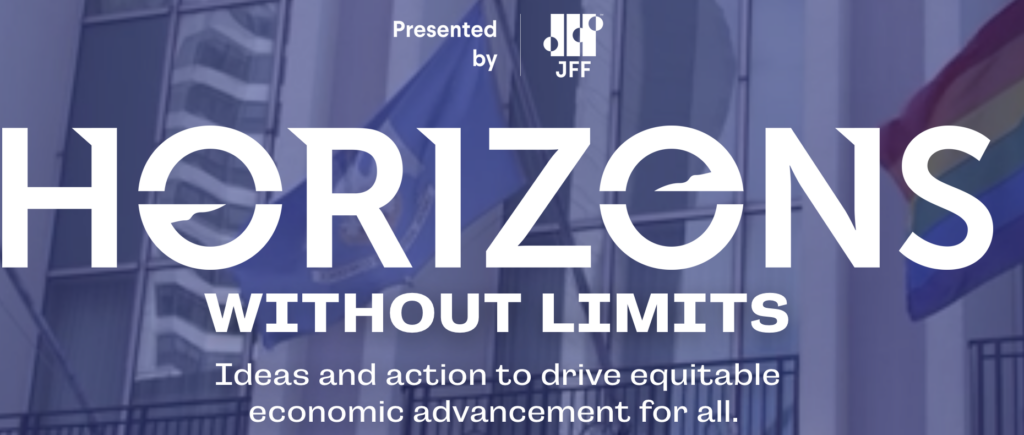Eyes on The Horizon: Where Industry and Education Meet
Key Points
-
Join panelists at the Horizons annual summit hosted by Jobs For the future.
-
Learn what each sector is contributing to the future of education and workforce development.

“Horizons, presented by Jobs for the Future, is the premier national platform for ideas and action to drive equitable economic advancement for all.”
Taken from the JFF Horizons website, this line accurately sums up the type of gathering we need right now. At present, there isn’t a single national industry event that focuses on high school intentional pathways and brings together 6-12 stakeholders with employers and workforce advocates. The economy, continued evolution with how we think about reciprocity and mutuality, 11 million open jobs, mounting uncertainty and more are just a few of the factors that drive the need for a convening of education and industry.
Also on the JFF Horizons website is a helpful statement of intention. JFF Horizons will:
- Create equitable opportunities for all learners and workers to advance
- Inform learners and workers about trusted, person-centered options for their education, training, and career pathways
- Inspire employers to take equity-centered approaches to hiring, training, and retaining workers
- Integrate our education and workforce systems to allow for lifelong learning and career mobility
- Build strong regional economies by connecting labor market supply to employer demand
We are honored to have a narrative change partnership with American Student Assistance (ASA) to elevate high school intentional pathways. We are excited that ASA is connecting the dots between our work and the work they are doing in conjunction with JFF on changing the narrative for postsecondary nondegree paths. Together, we have the opportunity to provide a forum for K12 education, postsecondary education and business leaders/employers to work collaboratively to help high school students become workforce and postsecondary education ready.
We hope to elevate the conversation around ALL pathways by making a deliberate connection between the real-world future planning that needs to happen in high school and the much needed mindset shift to help kids navigate the transitional space after high school–aka expanding widespread acceptance of non-degree paths.
We’re excited to share a few of the game-changing sessions:
The Crossroads of the Future of K12 Education, the Future of Higher Ed, and the Future of Workforce Development: Where Are We Headed?
Over 65% of GenZ said high school did little to prepare them to make education and career decisions. To compound matters, 79% of high schoolers say they want a work-based learning experience to help them test & try before the stakes are too high; yet only 2% have completed any type of real-world learning experiences. And, as the degree as a signal for workforce readiness continues to be scrutinized, over 50% of GenZ say they are not going the degree route and 74% say they prefer to learn skills that prepare them for jobs that will be in demand in the future. Lastly, employers are seeking to expand their candidate pools; yet, if not a degree, how do they evaluate credentials and skills? We are at an unprecedented crossroad. The pandemic response, new pathways and AI Everywhere is forcing us to consider what’s next in learning. The solution calls for both secondary and postsecondary educators plus employers, and civic leaders to come together to significantly reset the learning continuum to better prepare our young people for the ever-changing workforce. Join panelists to learn more about the shifting trends in education and how we each play a role in solving these challenges.
Working-to-learn experiences help learners build skills employers need and provide businesses with an expanded pipeline of talent.
Getting Smart Staff
New Models Blend High School, Higher Ed, and Workforce Development
Promising models are gaining traction and giving learners a new way to prepare for the workforce. CTE, early college, P-TECH and other blended high school/college programs have seen an all-time level of popularity as learners are searching for new paths to develop skills for future jobs. Enter stage right: blended pathways of the next generation – an emerging model that starts in high school and incorporates real-world experiences, college credit, and industry credentials to create paths to financial freedom. Join panelists as they discuss how secondary educators, postsecondary educators, and employers are approaching a reset of the paradigm.
Employers Leading the Way in High School Work-based Learning
Working-to-learn experiences help learners build skills employers need and provide businesses with an expanded pipeline of talent. When 79% of high school students say they are interested in a work-based learning experience, why have only 2% completed an internship? Join panelists on a discussion on the barriers facing high school learners and 6-12 educators in implementing a WBL program and how employers, who are interested in expanding their candidate pipelines, can overcome challenges and expand working-to-learn opportunities.
Verifying Skill Competency: Non-traditional Learning Paths
58% of Gen Z believe that companies should hire more high school graduates who have pursued non-degree education pathways. (And about 68% of employers agree.) For the learners who head down a non-degree path, how do they validate–and communicate–the mastery of skills acquired outside the traditional learning setting? If not a degree, what signals of quality will ensure that future employees are workforce ready? Digital credentials and learner records capture accelerated skill development with project-based, work-based and competency-based learning. Join panelists to learn what each sector is contributing to the future of education and workforce development. Join panelists as we discuss the future of validating skill mastery.
We hope to see you at the conference!
This post is part of our New Pathways campaign sponsored by American Student Assistance® (ASA), Stand Together and the Walton Family Foundation.






0 Comments
Leave a Comment
Your email address will not be published. All fields are required.